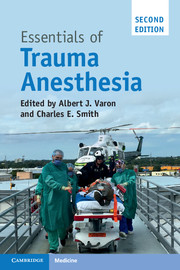Book contents
- Essentials of Trauma Anesthesia
- Essentials of Trauma Anesthesia
- Copyright page
- Epigraph
- Contents
- Contributors
- Preface
- Abbreviations
- Section 1 Core Principles in Trauma Anesthesia
- Chapter 1 Trauma Epidemiology, Mechanisms of Injury, and Prehospital Care
- Chapter 2 Initial Evaluation and Management
- Chapter 3 Airway Management
- Chapter 4 Shock, Resuscitation, and Fluid Therapy
- Chapter 5 Vascular Cannulation
- Chapter 6 Blood Component Therapy and Trauma Coagulopathy
- Chapter 7 General Anesthesia for Trauma
- Chapter 8 Regional Anesthesia for Trauma
- Chapter 9 Monitoring the Trauma Patient
- Chapter 10 Echocardiography in Trauma
- Chapter 11 Coagulation Monitoring of the Bleeding Trauma Patient
- Chapter 12 Postoperative Care of the Trauma Patient
- Section 2 Anesthetic Considerations for Trauma
- Section 3 Anesthetic Management in Special Trauma Populations
- Index
- References
Chapter 6 - Blood Component Therapy and Trauma Coagulopathy
from Section 1 - Core Principles in Trauma Anesthesia
Published online by Cambridge University Press: 30 October 2017
- Essentials of Trauma Anesthesia
- Essentials of Trauma Anesthesia
- Copyright page
- Epigraph
- Contents
- Contributors
- Preface
- Abbreviations
- Section 1 Core Principles in Trauma Anesthesia
- Chapter 1 Trauma Epidemiology, Mechanisms of Injury, and Prehospital Care
- Chapter 2 Initial Evaluation and Management
- Chapter 3 Airway Management
- Chapter 4 Shock, Resuscitation, and Fluid Therapy
- Chapter 5 Vascular Cannulation
- Chapter 6 Blood Component Therapy and Trauma Coagulopathy
- Chapter 7 General Anesthesia for Trauma
- Chapter 8 Regional Anesthesia for Trauma
- Chapter 9 Monitoring the Trauma Patient
- Chapter 10 Echocardiography in Trauma
- Chapter 11 Coagulation Monitoring of the Bleeding Trauma Patient
- Chapter 12 Postoperative Care of the Trauma Patient
- Section 2 Anesthetic Considerations for Trauma
- Section 3 Anesthetic Management in Special Trauma Populations
- Index
- References
- Type
- Chapter
- Information
- Essentials of Trauma Anesthesia , pp. 69 - 81Publisher: Cambridge University PressPrint publication year: 2017

